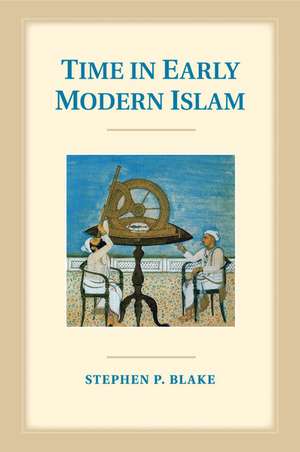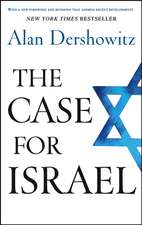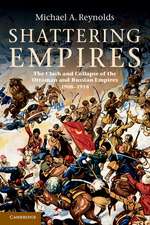Time in Early Modern Islam: Calendar, Ceremony, and Chronology in the Safavid, Mughal and Ottoman Empires
Autor Stephen P. Blakeen Limba Engleză Paperback – 16 aug 2017
| Toate formatele și edițiile | Preț | Express |
|---|---|---|
| Paperback (1) | 281.49 lei 6-8 săpt. | |
| Cambridge University Press – 16 aug 2017 | 281.49 lei 6-8 săpt. | |
| Hardback (1) | 690.80 lei 6-8 săpt. | |
| Cambridge University Press – 10 feb 2013 | 690.80 lei 6-8 săpt. |
Preț: 281.49 lei
Nou
Puncte Express: 422
Preț estimativ în valută:
53.86€ • 56.50$ • 44.84£
53.86€ • 56.50$ • 44.84£
Carte tipărită la comandă
Livrare economică 01-15 aprilie
Preluare comenzi: 021 569.72.76
Specificații
ISBN-13: 9781108412803
ISBN-10: 1108412807
Pagini: 223
Ilustrații: 3 maps
Dimensiuni: 152 x 230 x 12 mm
Greutate: 0.3 kg
Editura: Cambridge University Press
Colecția Cambridge University Press
Locul publicării:New York, United States
ISBN-10: 1108412807
Pagini: 223
Ilustrații: 3 maps
Dimensiuni: 152 x 230 x 12 mm
Greutate: 0.3 kg
Editura: Cambridge University Press
Colecția Cambridge University Press
Locul publicării:New York, United States
Cuprins
1. Safavid, Mughal and Ottoman empires; 2. Calendar; 3. Ceremony; 4. Chronology: era; 5. Chronology: millenarian.
Recenzii
'This work is … both of general human interest, as well as specific interest with respect to the dialogue between 'Islam and the West' today.' Amina Inloes, Journal of Shi'a Islamic Studies
'… a well-written and well-organized summation of the complexities of time management in Muslim societies, not only in the early modern period, but throughout Islamic history. The book will prove useful as an introduction to these issues for both advanced undergraduate and graduate students.' John J. Curry, Middle East Media and Book Reviews (membr.uwm.edu)
'… Blake's book is a fascinating exploration of how early modern empire building was far more complex than the application of an imperial ideology that hinged on a pure religious identity. Rather, as evidenced through three distinct applications of time and ceremony in building Islamic empires, empire building was a recursive reconciliation of the ideology of the metropole with local conditions and expectations that allowed for the intersection of unique cultures in areas of commerce and the exchange of ideas. While the ruling elite of each of the three empires in Blake's study saw itself as the power base of an Islamic empire, all three empires were nevertheless the successors of the preceding cultures that they conquered and were subsequently compelled to use localized cosmopolitan constructions and understandings of time to ossify the reality of their power and to secure the viability of their empires.' H-War
'… a well-written and well-organized summation of the complexities of time management in Muslim societies, not only in the early modern period, but throughout Islamic history. The book will prove useful as an introduction to these issues for both advanced undergraduate and graduate students.' John J. Curry, Middle East Media and Book Reviews (membr.uwm.edu)
'… Blake's book is a fascinating exploration of how early modern empire building was far more complex than the application of an imperial ideology that hinged on a pure religious identity. Rather, as evidenced through three distinct applications of time and ceremony in building Islamic empires, empire building was a recursive reconciliation of the ideology of the metropole with local conditions and expectations that allowed for the intersection of unique cultures in areas of commerce and the exchange of ideas. While the ruling elite of each of the three empires in Blake's study saw itself as the power base of an Islamic empire, all three empires were nevertheless the successors of the preceding cultures that they conquered and were subsequently compelled to use localized cosmopolitan constructions and understandings of time to ossify the reality of their power and to secure the viability of their empires.' H-War
Notă biografică
Descriere
Stephen P. Blake compares the Islamic concept of time across the empires of the Safavids, Ottomans and Mughals.












